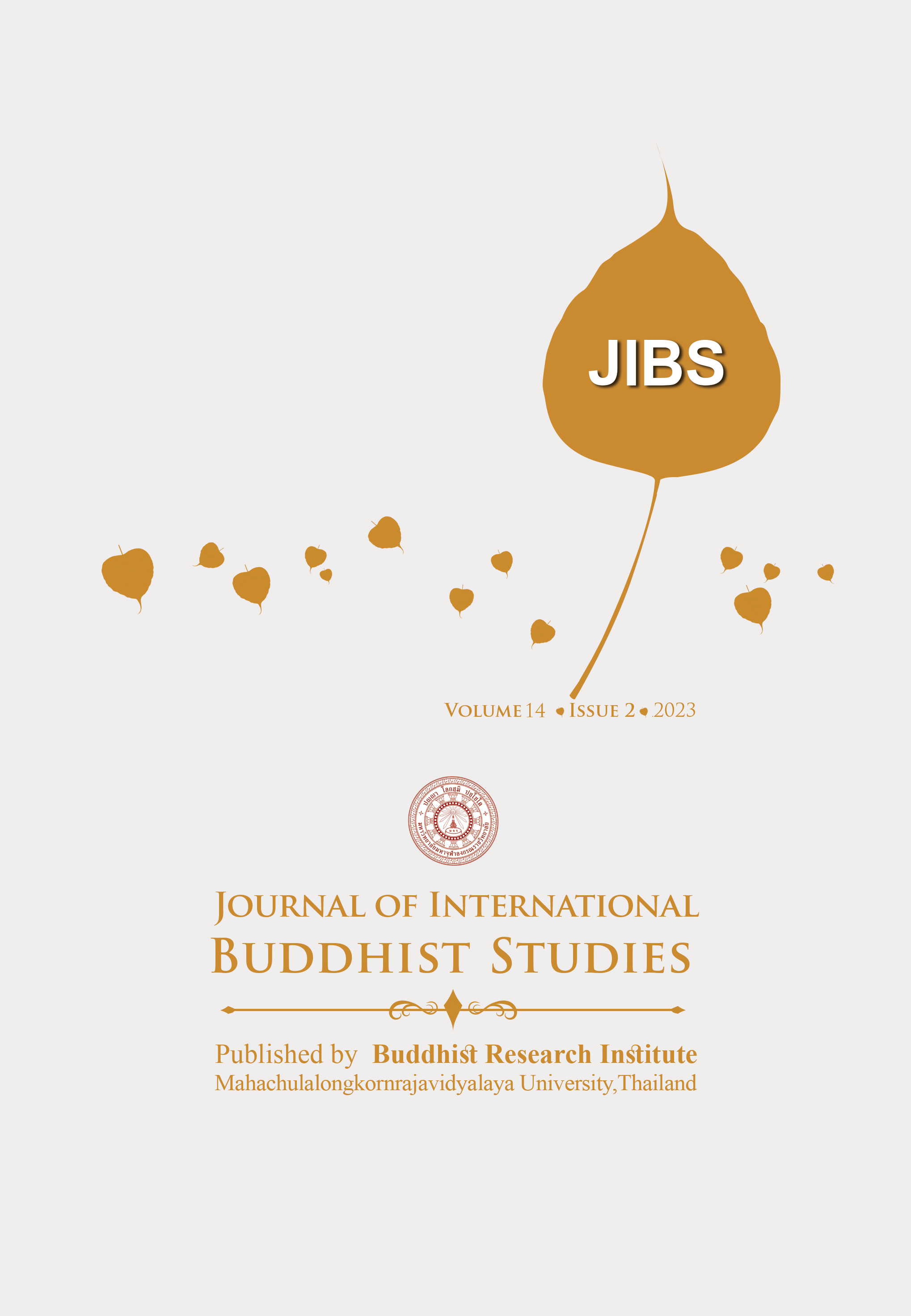A Transformative Learning Model Towards a Peaceful Death Preparation through Buddhist Peaceful Means for Thai Buddhist Adults
Keywords:
Buddhist Peaceful Means, Peaceful Death, Thai Buddhist Adults, Transformative LearningAbstract
No one indeed escapes death. To acquire valuable knowledge and enhance a peaceful death for a decent quality of life, it is essential to comprehend the quality of death and dying. Regarding this, it is crucial to prepare for a peaceful death through transformative learning. Therefore, this research aims to 1) study the concept of dying and peaceful death in general understanding and Theravāda Buddhist Teachings; 2) explore the theory of transformative learning; and 3) propose a model as a guideline to support peaceful death preparation. Data were compiled through documentary analysis, synthesis, and in-depth interviews with about twenty key informants split into five groups, using a qualitative research methodology. Based on the research objectives, the results were separated into three main categories and revealed that individuals desire both a decent life and a peaceful death. Knowledge and attitudes about death can have a significant impact on a person’s way of life. Whereas in Buddhism, the five aggregates dissolve upon death and are significantly influenced by Kamma, non-self, impermanence, and suffering. Constantly contemplating death liberates an individual from attachment to both pleasant and unpleasant and enables one to confront death intelligently and peacefully. To enable peaceful death preparation in the cultural context of Thai Buddhism, the research contributes to the PSIAM model, which specifies the crucial elements and processes of transformative learning. This model offers Thai Buddhist adults an invaluable framework for comprehending and encouraging peaceful death preparation practices, and it may have implications for other cultural and religious contexts.
References
Charuchinda, Varithta. “Decreasing the Death Anxiety Using Buddhist Psychology.” Journal of Buddhist Psychology 3 (2018): 1-10.
Cranton, Patricia. Understanding and Promoting Transformative Learning: A Guide to Theory and Practice. Virginia: Stylus Publishing, LLC, 2016.
Ezirow, Jack M. An Overview of Transformative Learning, Contemporary Theories of Learning. New York: Routledge, 2019.
Khunakaro, Phramahasomphong et al. “Developing Mind by Using Mindfulness as a Base in the 21st Century.” Journal of Positive School Psychology 6 (2022): 8895-8901.
Kitinandro, PhrakhubaideekaHasadee. “The Threefold Training: The Science of Life for the Path Development.” Journal of MCU Ubon Review 7 (2022): 105 -110.
Morris, Thomas H. “Transformative Learning Through Mindfulness: Exploring the Mechanism of Change.” Australian Journal of Adult Learning 60 (2020): 44-65.
Mulkins, Andrea L. and Marja J. Verhoef. “Supporting the transformative process: experiences of Cancer Patients receiving integrative care.” Integrative Cancer Therapies 3 (2004): 230- 237.
Müller, Regina and Stephanie Kaiser. “Perceptions of Medical Futility in Clinical Practice – A Qualitative Systematic Review.” Journal of Critical Care 48 (2018): 78-84.
Nathapunyo, Phramahaboonpasid and Phrasutthisanmethi. “Mindfulness of Death’s Cultivation.” Journal of Dhamma for Life 29 (2023): 62-75.
National Strategy Secretariat Office. Office of the National Economic and Social Development Board. National Strategy 2018-2037 (Summary). Bangkok: National Strategy Secretariat Office; 2017.
Phrakruvithuthamwimol and Phrakruphiphitcharutham. “A Study of Maranasati for Development in life.” Journal of Graduate Review Nakhon Sawan Buddhist College 7 (2019): 1-10.
Phrarajaparayattimuni et al. “Model Development of Buddhist Transformative Learning Process Management.” Journal of Palisueksabuddhaghosa Review 7 (2021): 1-11.
Rinrit, Phrasitthichai et al. “The Application of Dhamma Principle in Daily Life.” Academic Journal of Mahamakut Buddhist University Roi Et Campus 10 (2021): 891-901.
Ross, Elisabeth K. On Death and Dying. Oxford: Routledge, 2009.
Siriwathano, PhrakhusangkharukKittiphong and Mai Boonmee. Learning Management to Raise the Citizenship Consciousness Based on Buddhism in Thailand. Ayutthaya: Buddhist Research Institute Mahachulalongkornrajavidyalaya University, 2016.
Somdetphrabuddhaghosacariya (P.A. Payutto). Buddhadhamma: The Laws of Nature and Their Benefits to Life, tr. By Robin P. Moore. Bangkok: Buddhadhamma Foundation, 2017.
Sumedho. The Four Noble Truths. Hertfordshire: Amaravati Publications, 2020.
Upasen, Ratchaneekorn et al “Death Acceptance Process in Thai Buddhist Patients With Life-Limiting Cancer: A Grounded Theory.” Global Qualitative Nursing Research 9 (2022).
Wahchu, Samuel K. et al. 21st Century Skills Development Through Inquiry-Based Learning. Singapore: Springer Nature, 2017.







